- Home
- Steven Harper
un/FAIR
un/FAIR Read online
This book is a work of fiction. Names, characters, places, and incidents are either products of the author’s imagination or are used fictitiously. Any resemblance to actual persons, living or dead, business establishments, events, or locales is entirely coincidental. The author makes no claims to, but instead acknowledges the trademarked status and trademark owners of the word marks mentioned in this work of fiction.
Copyright © 2016 by Steven Harper
un/FAIR by Steven Harper
All rights reserved. Published in the United States of America by Month9Books, LLC.
No part of this book may be used or reproduced in any manner whatsoever without written permission of the publisher, except in the case of brief quotations embodied in critical articles and reviews.
ISBN: 978-0-9968904-1-0
Published by Tantrum Books for Month9Books
Cover illustrated and designed by Mat Dawson
Cover copyright © 2016 Tantrum Books for Month9Books
To my son, Aran
PART I
CHAPTER ONE
Ryan November woke up on his eleventh birthday and knew he’d be able to see the future by breakfast. He rolled over. His clock said 6:56, so he couldn’t get up for four more minutes. That was all right. He didn’t mind waiting.
Not until he saw the string.
The string was made of liquid silver and lay piled in the exact center of a perfect square of May sunshine on his bedroom floor. It gleamed where the sunlight struck it. Ryan stared. He had never seen it before. The messy string looked out of place in the perfectly neat room. In Ryan’s room, every piece of clothing hung in the closet or lay folded in a dresser drawer. Every book sat in alphabetical order on the shelf. Every toy and video game stood arranged in rows more orderly than troops of soldiers. The squiggle of silver string on the floor made Ryan’s head itch on the inside, where he couldn’t scratch. He wanted to pick the string up and put it away.
The clock stopped him. The little red numbers read 6:57 now—three more minutes to go, even though he wanted to examine the string very badly.
Maybe he could find a way around the problem. Automatically, Ryan ran a flowchart in his mind. If he had written it down, it would have looked like this:
The chart put him at “Stay in bed,” so he lay there, trying not to scratch his head or squirm with suspense, until at last the numbers flicked to 8:00. Ryan pushed the blankets aside and hurried over to pick up the string, still squiggled across the floor. The moment he touched it, the string moved on its own. It jumped into his hand like a little snake. He felt a cold, tingly sensation, and the string was gone. Instead, there was a perfect circle of raised skin around the palm of his left hand.
“Wow,” Ryan said.
Ryan liked circles. He liked their symmetry, the way you couldn’t tell where they started or ended, the way every part was like every other part. He traced the circle with his finger and smiled. He could have a circle with him wherever he went. Then, because Saturday was a brown day, he put on brown cargo pants, a brown shirt, and brown socks before pulling on his shoes and heading for the stairs. Ryan had red-blond hair that he tried to keep combed but always got away from him, a thin sprinkling of freckles that thickened in the summer, and somber eyes that his best friend Alison always described as “blue pools of inexactitude,” which bugged Ryan because he didn’t know what it meant. At the last second, Ryan remembered to grab his cell phone from his dresser. The circle had almost made him forget. There were already two text messages on the screen:
Happy Shared B-Day, R!!
and
Happy day kiddo!
He texted back, his thumbs jumping across the keypad like precise, tiny frogs:
Happy Shared Birthday to you, too, Alison!
and
Thanks, Mom.
Ryan never felt quite right abbreviating, so he didn’t. Then he traced the circle on his hand one more time and tromped downstairs.
There were fourteen wooden steps leading down to the kitchen. Each one had nine wooden pegs pounded in a straight line across the front edge, and Ryan automatically counted them all at a glance. 126 pegs, just like yesterday and the day before that and the day before that. He liked the number 126. The digits added up to nine, which was also the number of pegs in each step. The number 126 was a good number to start the day with. He jumped over step number twelve. Ryan didn’t like the number twelve. It was divisible by too many other numbers—itself, six, four, three, two, and one. That was half the numbers between one and twelve. Ryan always felt like twelve would keep dividing itself until it vanished entirely, and he didn’t want to step on a stair that might disappear.
Ryan rounded the turn in the staircase and emerged in the kitchen. It was big and airy, and right now it smelled like butter and hot batter. Aunt Zara was on breakfast duty this morning, and today she had settled on pancakes, Ryan’s favorite. Ryan quietly took his usual place on the bench that ran down the long wooden table. Everything in the Cottage was wood—walls, floor, cupboards, ceiling. Wood hinges held the doors on, and wood latches held them shut. Raw exposed beams ran up to support the roof, and the shingles were made of flat wood. The entire house was held together with wooden pegs. Ryan’s dad boasted that not one scrap of steel held the house together. Instead, the builders had used copper and plastic and ceramic. Ryan liked this. Metals like iron and steel felt heavy and harsh and made his stomach queasy.
“My, my. Happy birthday, Ryan,” Aunt Zara said, and put a plate of pancakes in front of him. Ryan tensed a little. Food you could count had to come in even numbers. Mom always remembered this when she cooked, but Aunt Zara sometimes forgot, and it could turn a simple meal into a disaster. Quickly he counted. Two pancakes, two pieces of sausage. Ryan sighed with relief. It would be bad to get the wrong number of pancakes on his birthday.
Ryan glanced up at Aunt Zara. She favored blue blouses and long skirts that flowed together like waterfalls. She wore her blond hair loose around her shoulders except for two blue barrettes that kept her bangs out of her face. She had a long nose and a wide mouth. At the moment, she was smiling with her teeth showing. Her voice had an upbeat tone to it, and she moved like her body was relaxed. Ryan added these things up and decided Aunt Zara was happy. The appropriate response, Ryan had learned, was a smile. So he smiled. Then he remembered that she had just given him something—his breakfast. It meant he had to say something.
“Thank you,” he said slowly, and tensed slightly, wondering if he had gotten it wrong. It seemed like he got it wrong a lot.
“You’re welcome.” Aunt Zara tried to pat his shoulder, but Ryan ducked away. “Sorry, sweetie. I forget.”
Ryan didn’t like it when people touched him. It felt beyond weird to feel their skin sliding over his in ways he couldn’t control. And a hug felt like being suffocated in wet blankets. When he was little, he had screamed and hit. Now he ducked and dodged.
Aunt Zara headed back for the stove. Ryan was turning to his pancakes, silver fork poised, when his world flickered for a second. Everything grew brighter, as if someone had doubled the sunlight, and he heard a knock. A dark-haired girl poked her head through the screen door and said, “Is he still eating breakfast?” and her voice had a strange, ghostly quality to it. Then the extra light vanished and everything snapped back to normal. Ryan realized no time had passed at all.
A knock came, and a dark-haired girl poked her head through the screen door. “Is he still eating breakfast?” Ryan stopped eating to stare. He had just seen this happen twice.
“Come in, Alison,” Aunt Zara sang out. “You’re just in time for pancakes.”
Alison Ferrier stalked through the door and angled across the kitchen to the table, her skinny legs and sharp elbows poking carelessly in all directions. Even h
er ponytail looked sharp. Ryan watched her, caught in an awful fascination. One day she was going to puncture something, he was sure of it. Alison was Ryan’s best—his only—friend, and she lived in a tiny trailer in the woods with three sisters and two brothers and one mother (making seven people total, and seven was a prime number). Like him, she was turning eleven today (another prime number, and if you added one and one, you got two). It took two people to be friends, and two was the only even prime number. Ryan liked that.
Alison folded herself onto the bench beside him. “Two pancakes, two sausages,” she said, looking at his plate. “Will it bug you if I have three and three?”
“No,” Ryan said. “That plate over there”—he pointed—“has one pancake on it, so that makes everything Fibonacci.” He said the word the Italian way: feeb-oh-NAH-chee.
“Fibonacci?”
“You know. Zero and one make one, then one and one make two, two and one make three.”
“Oh, right. Cool.”
“My, my. Doesn’t your family feed you?” Aunt Zara asked, setting a plate down in front of her.
“Nope,” Alison said, her mouth already full, and Ryan couldn’t tell if this was a lie or not. He thought about asking, then decided not to and ate more pancakes instead.
“Today is our birthday,” Ryan said. “May first.”
“Yep.” Alison grinned, showing a big mouthful of smooshed-up Fibonacci pancake. Ryan laughed. “Where’s everyone else?”
“I don’t know,” Ryan said.
“Your dad went down to the lake for some early fishing,” Aunt Zara said from the stove. “Aunt Ysabeth and your mother are wrapping birthday presents. So stay out of your mother’s bedroom, Ryan, if you don’t mind.”
There was another flick. The world brightened again, and this time Aunt Zara dropped a spatula. It clattered on the stove. Alison spilled her milk, creating a chaotic mess that rushed over the table and dripped into Ryan’s lap.
The world flicked back to normal. Aunt Zara dropped her spatula. It clattered on the stove. Alison reached for her milk glass. Ryan flinched at the upcoming mess. Chaos was the worst. It hurt his stomach and made his head feel like it was going to explode. So he reached out with his own hand and slapped hers down, pinning it to the table.
CHAPTER TWO
“What are you doing?” Alison demanded in surprise.
“You were going to spill your milk,” Ryan said.
“No, I wasn’t.” Her mouth pulled tight and her eyes squinted up and her body stiffened. Ryan thought about it, and decided she was angry. She was angry at him.
In that moment, all of Ryan’s words vanished. It was as if someone had stuffed all his sentences and paragraphs into a trunk inside his brain and slammed the lid. He couldn’t speak, couldn’t even form his thoughts into words. He felt unhappy and uncomfortable. He wanted to stretch his arms out and flap his hands like he used to when he was little. The patterns he created with his body always had made him feel better. But doing that was Wrong because it was Weird, and he had learned not to do that anymore.
Instead, he took his hand away from Alison’s and with his forefinger traced the new circle on his palm over and over. The simple pattern calmed him down a little, but not enough so he could speak. His family called this and some of the other stuff Ryan did autism, though Ryan rarely used the word himself.
“Oh, never mind,” Alison grumped, and ate more pancake instead. The milk stayed safe in her glass. There was yet another flick and Ryan felt dizzy for a moment. Then the world steadied again.
“We’re all done wrapping and we’re ready for breakfast,” came Mom’s voice, and two more women entered the kitchen. Aunt Ysabeth preferred sweats and slip-on shoes, while Xaveria Smith-November—Ryan’s mother—always wore neatly-pressed khaki slacks and button-front blouses. But they and Zara had the same long nose, the same blue eyes, the same blond hair. It was because they were identical triplets, and even though they wore different clothes and had different hair styles, Xaveria, Ysabeth, and Zara looked exactly alike.
The three women did have other differences besides in the way they dressed. All three of them were writers, but each of them wrote something different. Xaveria was a reporter for the Associated Press and traveled all over the world. Ysabeth wrote cookbooks, celebrity memoirs, and self-help books (Twelve More Ways to Stop Disliking Your Bad Side had climbed to number three on the New York Times Best-Seller list). Zara wrote novels—mysteries, romances, fantasy, science fiction. The biggest difference among them, of course, was that Xaveria was the only one who had gotten married and had a kid. Ryan.
“You said presents, not present,” Ryan said. “Does that mean you got one for both of us?”
“You said presents, not present. Does that mean you got one for—” Alison began, then halted. She stared at Ryan.
“Say it,” Ryan whispered.
“Both of us?” she finished.
“How did you know I was going to say that?” Ryan said quietly.
“How did you—” Alison whispered, and interrupted herself again, but this time she didn’t finish her sentence, and Ryan found he didn’t like that at all. She was supposed to say the whole thing.
“Yes, as it happens,” Aunt Ysabeth said, not noticing the exchange. “Indeed, yes.”
Alison recovered quickly. She always thought fast. It was what Ryan liked about her. “I like that you got me a present, Ms. November. My family kind of forgot. They do that.”
“That’s a shame, it is indeed,” Aunt Ysabeth said, “but we’re glad you can celebrate with us, Alison.”
Aunt Zara absently handed a platter piled high with pancakes to Mom, who took it without looking and set it on the table while Aunt Ysabeth set coffee cups near the plates. Ryan counted—Nine pancakes. Not a Fibonacci number. If Dad came back from fishing and all the adults ate, the numbers wouldn’t come out even. He traced the circle on his palm to make himself feel better.
Aunt Ysabeth poured three cups of coffee. Mom added sugar to each and Aunt Zara came behind with the cream pitcher. Mom said to Ryan, “How’s the birthday so far?”
“Good,” he said. “Weird.”
“Hm. Weird?”
Ryan thought about telling Mom and the Aunts about the string and the circle and how he was seeing the future. But then he got another flash. He and Alison were heading down to the lake together, and they hadn’t told the adults anything. He quickly stuffed a bite of pancake into his mouth, swallowed, and looked at Alison. She rolled her eyes, knowing what he wanted. It was hard for Ryan to lie, or even leave something out of the truth, so he always looked to Alison to do it for him.
“Weird because I’m here,” Alison said.
“You’re always here,” Aunt Zara said. “Nothing weird about that.”
Alison shrugged. “We want to go down to the lake.”
Ryan admired the way she could change the subject like that. He would have been stuck on it.
“If you’re done with your—oh, you are. My, my.” Aunt Zara said. “Go on, then.”
The two children all but bolted from the Cottage. Outside was the perfect sunny June day, with a diamond-clear sky and the smell of fresh lake water on the air. The big, creaky Cottage sat at the top of a grassy cliff, and from the bottom of the cliff to the horizon, Lake Michigan stretched into the distance. Right now the lake was calm and blue, but Ryan had seen it green and angry plenty of times.
A wooden staircase clung to the side of the cliff, and the two friends clattered down the boards with practiced ease. Like the house, the staircase had no nails in it. It used to have 144 steps. Ryan, then age six, had been halfway down the stairs when he realized this fact for the first time. 144 was twelve times twelve, and there were so many ways to divide it that no stair was safe. Ryan could almost feel the steps disappearing beneath him. He had screamed and screamed and screamed, and Dad had been forced to carry him back up the stairs. It had taken Ryan three days to find his words again. Once he had managed to explain
what was wrong, Dad had rebuilt part of the staircase to add five more steps. 149 was a prime number, and nothing could divide it. The staircase was safe now, even if the bottom ten stairs were smaller than the other 139.
At the bottom, with its back to the cliff, stood a rough shelter made of driftwood. Alison had built it herself, and the two friends used it as their private hideaway. Inside they had some old porch furniture, a bunch of jars for collecting weird stuff from the lake, some interesting rocks, a pile of old beach towels in case anyone wanted to go swimming on a moment’s notice, and other odds and ends.
It was on this spot that Alison and Ryan had first met, two summers after the awful staircase day. Ryan had been pacing up and down the beach reciting dialogue from the cartoon show Flashcard Battle Brawl. He knew every episode by heart, and he liked to repeat them, complete with sound effects.
“You’ll never defeat us, Hoshi!” Ryan shouted. “The light cards will take back the Medallion of Ultra-Power!”
“I know that one,” said a dark-haired girl. “Hoshi throws down a battle swan and says, Snowstorm! Attack with Megawind!”
Ryan froze. He hadn’t noticed the girl approach, and he wasn’t sure what to do. He flipped through his mental flowcharts and selected one of them.
The chart didn’t quite cover the situation. It said he wasn’t supposed to talk about Flashcard Battle Brawl, but the girl had already brought it up. Still, Ryan knew he was supposed to say something.
“Kevin throws down a defense turtle and shouts, Stoneshell! Defend with Gravity Claws!” he said.
The girl nodded approval. “I’m Alison.”
Here Ryan was on firmer ground. “My name is Ryan.” The chart hinted he should ask her name, but she’d already given it to him, so he added, “My birthday is on May first.”
“Really? That’s my birthday, too. It’s the best day to have a birthday,” Alison had said. And they had become friends.
Inside the open shelter, Alison folded her skinny arms across her chest. A cool spring breeze rolled over them from the lake and little waves lapped at the stony shore. “I saw that weird circle on your hand,” she said. “It’s why I said we wanted to come down to the beach. Show me better.”

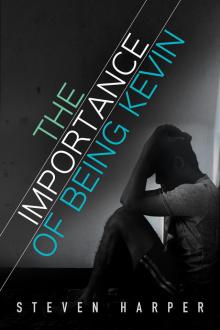 The Importance of Being Kevin
The Importance of Being Kevin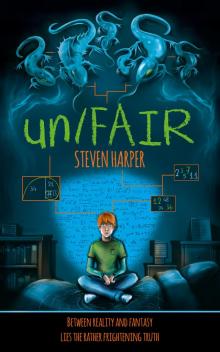 un/FAIR
un/FAIR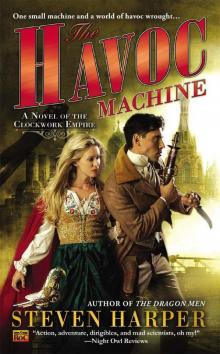 The Havoc Machine
The Havoc Machine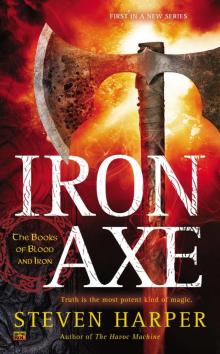 Iron Axe
Iron Axe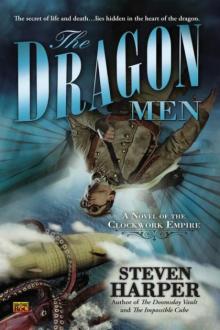 The Dragon Men
The Dragon Men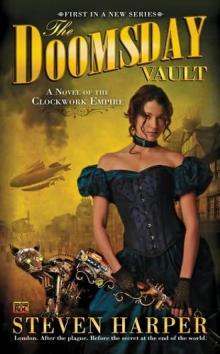 The Doomsday Vault ce-1
The Doomsday Vault ce-1 The Doomsday Vault
The Doomsday Vault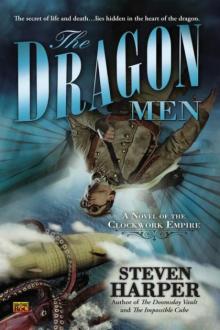 The Dragon Men ce-3
The Dragon Men ce-3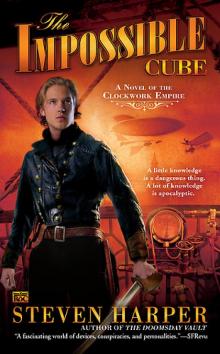 The Impossible Cube
The Impossible Cube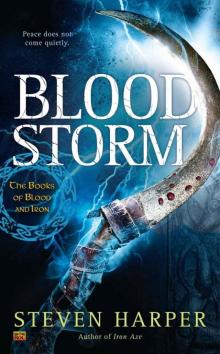 Blood Storm: The Books of Blood and Iron
Blood Storm: The Books of Blood and Iron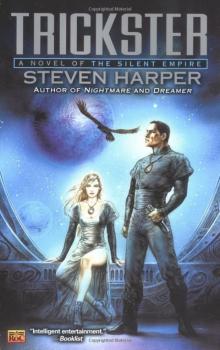 Trickster se-3
Trickster se-3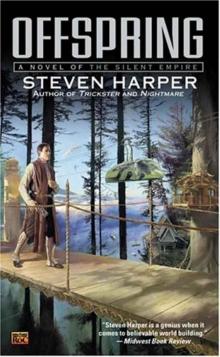 Offspring
Offspring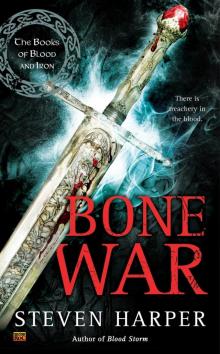 Bone War
Bone War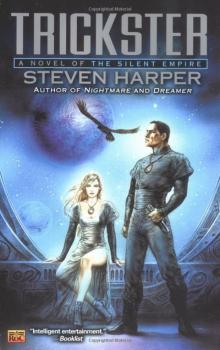 Trickster
Trickster Unity
Unity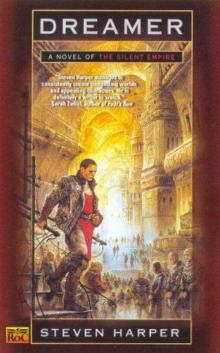 Dreamer
Dreamer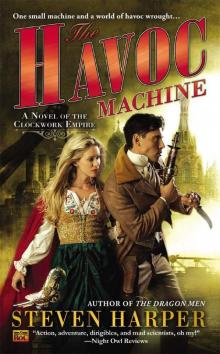 The Havoc Machine ce-4
The Havoc Machine ce-4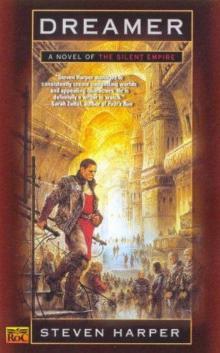 Dreamer se-2
Dreamer se-2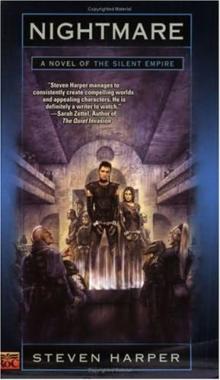 Nightmare se-2
Nightmare se-2